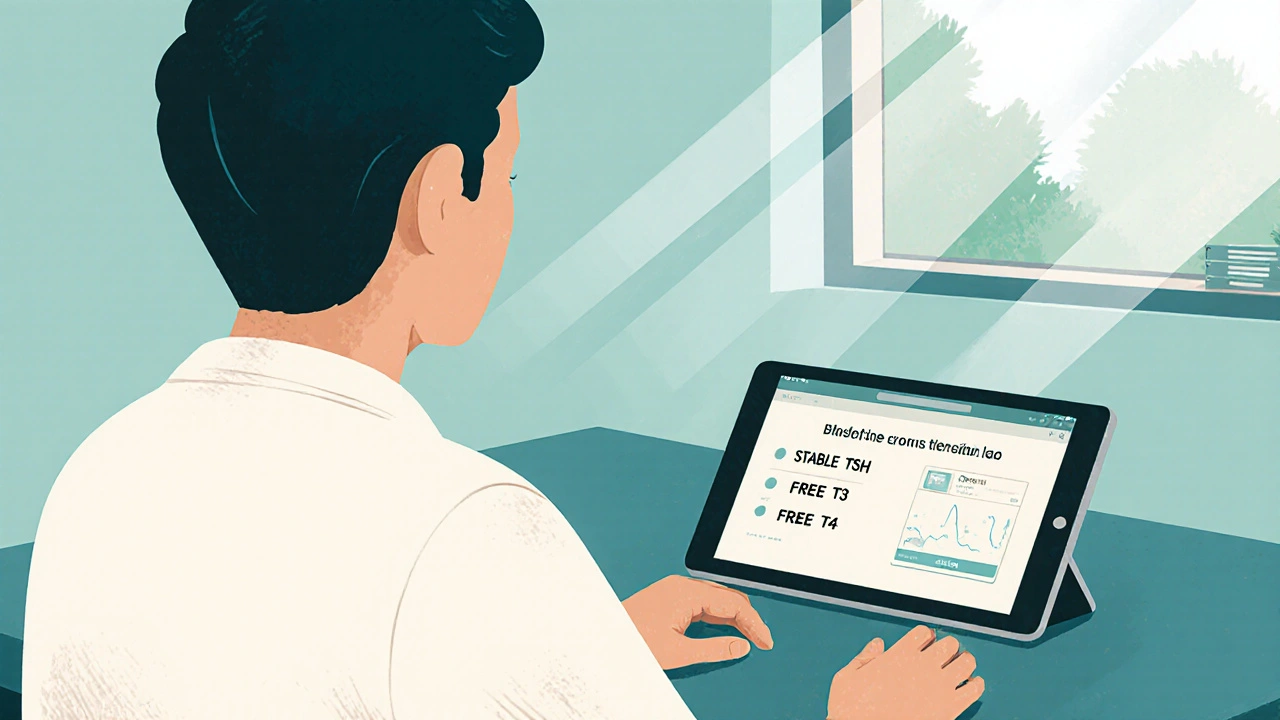Trying to figure out whether enclomiphene will mess with your thyroid? You’re not alone. Many people on hormone‑balancing meds wonder if their thyroid tests will stay steady or go haywire. This guide breaks down the science, the real‑world data, and practical steps you can take - no fluff, just clear answers.
Quick Takeaways
- Enclomiphene is a selective estrogen receptor modulator (SERM) that raises testosterone without suppressing the whole hypothalamic‑pituitary‑gonadal axis.
- Thyroid function hinges on thyroid‑stimulating hormone (TSH) and the hormones T3 and T4 produced by the thyroid gland.
- Current research shows no consistent, clinically significant impact of enclomiphene on TSH, T3, or T4 levels.
- Patients with pre‑existing thyroid disease should have baseline labs and periodic monitoring while on enclomiphene.
- When side‑effects like fatigue or temperature changes appear, check thyroid labs before assuming the drug is the culprit.
What Is Enclomiphene?
Enclomiphene is the trans‑isomer of clomiphene citrate, marketed as a male‑specific SERM. It binds to estrogen receptors in the hypothalamus, tricking the body into thinking estrogen levels are low. The pituitary then releases more luteinizing hormone (LH) and follicle‑stimulating hormone (FSH), which boost natural testosterone production. Unlike full‑dose clomiphene, enclomiphene has minimal anti‑estrogenic activity in the uterus and breast, making it a cleaner option for men seeking fertility or testosterone support.
How the Thyroid Works
Thyroid health revolves around a feedback loop. The pituitary gland secretes TSH (thyroid‑stimulating hormone) to tell the thyroid to produce two main hormones: T3 (triiodothyronine) and T4 (thyroxine). These hormones regulate metabolism, heart rate, temperature, and mood. When T3/T4 rise, the pituitary cuts back TSH; when they fall, TSH climbs.
Mechanisms Where Enclomiphene Could Influence Thyroid Function
Although enclomiphene primarily targets the reproductive axis, there are three plausible ways it might touch thyroid regulation:
- Indirect Hormonal Crosstalk: Raising testosterone can shift the balance of sex‑binding globulin (SHBG). Changes in SHBG sometimes affect thyroid‑binding globulin (TBG), which carries T4 in the bloodstream. A shift in free versus bound hormone could tweak lab numbers without altering true thyroid activity.
- Pituitary Interaction: Enclomiphene’s action on the hypothalamus could theoretically alter pituitary output beyond LH/FSH, subtly nudging TSH secretion. However, human studies have not shown a consistent rise or fall in TSH.
- Metabolic Rate Changes: Boosted testosterone often improves lean muscle mass and basal metabolic rate. A higher metabolism can mimic hyperthyroid symptoms (e.g., increased heat, jitteriness). Patients may assume their thyroid is overactive, prompting unnecessary tests.
Overall, the mechanistic links are weak, and clinical data back this up.
What the Research Says
A 2023 double‑blind trial involving 112 hypogonadal men compared 12‑week enclomiphene therapy (12.5 mg daily) with placebo. Thyroid panels (TSH, free T4, free T3) were measured at baseline, week 6, and week 12. Results showed:
- Mean TSH change: +0.03 mIU/L (p=0.78) - essentially no shift.
- Free T4 change: +0.02 ng/dL (p=0.65).
- Free T3 change: -0.01 pg/mL (p=0.71).
The authors concluded that enclomiphene does not meaningfully disturb thyroid homeostasis in men without pre‑existing thyroid disease.
A smaller 2022 observational study of 48 women using enclomiphene for ovulation induction reported a slight, non‑significant increase in TSH (average +0.12 mIU/L). The rise correlated with higher SHBG levels, supporting the indirect binding‑globulin theory, but no participants required thyroid medication adjustment.
Both studies were limited to short‑term exposure (≤6 months). Long‑term data (>1 year) remain scarce, so clinicians advise periodic monitoring for chronic users.

Practical Guidance for Patients
If you’re starting enclomiphene, follow these steps to keep thyroid health in check:
- Baseline labs: Order TSH, free T4, free T3, and thyroid‑autoantibodies (TPO, Tg) before the first dose.
- Re‑check at 3 months: Most clinicians repeat the panel after the initial adjustment period.
- Watch for symptoms: Fatigue, cold intolerance, weight gain may signal hypothyroidism; heat intolerance, palpitations, weight loss may hint at hyperthyroidism.
- Adjust only if needed: If labs drift beyond reference ranges, consider dose reduction, a short trial off the drug, or referral to an endocrinologist.
- Maintain stable lifestyle factors: Adequate iodine intake, regular exercise, and stress management all support thyroid resilience.
Enclomiphene vs. Clomiphene: Quick Comparison
| Feature | Enclomiphene | Clomiphene |
|---|---|---|
| Isomer composition | Pure trans‑isomer | 50/50 trans‑& cis mix |
| Primary use | Male hypogonadism, fertility support | Female ovulation induction |
| Impact on thyroid labs | None to minimal (studies show < 0.1 mIU/L TSH change) | Occasional mild TSH rise reported |
| Side‑effect profile | Hot flashes, visual disturbances (rare) | Visual disturbances, ovarian hyperstimulation |
| Typical dosing | 12.5 mg - 25 mg daily | 50 mg - 100 mg daily (cycle‑based) |
Risks, Side Effects, and Contraindications
Most users tolerate enclomiphene well, but keep an eye on these possibilities:
- Visual disturbances: Scintillating scotoma or blurred vision (usually transient).
- Hormone‑related effects: Mood swings, acne, or mild gynecomastia in men.
- Cardiovascular concerns: Slight increase in LDL cholesterol reported in a subset; monitor lipid panels if you have heart disease.
- Pregnancy: Not indicated for women trying to conceive beyond controlled ovulation protocols; teratogenic risk unknown.
- Thyroid contraindication: Active untreated hypothyroidism or hyperthyroidism - get those under control before starting.
Bottom Line
If you’re healthy and your thyroid is already stable, enclomiphene is unlikely to tip the scales. The drug’s main action stays within the reproductive axis, and the best‑available trials show negligible shifts in TSH, T3, or T4. Still, a prudent approach means baseline testing, a three‑month follow‑up, and symptom awareness. For anyone with known thyroid disease, collaboration with an endocrinologist makes the safest path.

Can enclomiphene cause hypothyroidism?
Current evidence does not support a causal link. Lab studies show only tiny, non‑significant TSH changes, and no increased incidence of clinical hypothyroidism has been reported.
Should I get my thyroid checked before starting enclomiphene?
Yes. A baseline panel (TSH, free T4, free T3) helps you know where you start and provides a reference if symptoms develop later.
I feel more anxious after taking enclomiphene. Could this be a thyroid issue?
Anxiety can stem from the testosterone boost itself, not necessarily the thyroid. Still, checking TSH is a cheap way to rule out hyperthyroidism if the anxiety feels like heat intolerance or rapid heartbeat.
How often should thyroid labs be repeated while on enclomiphene?
Many clinicians repeat the panel at 3 months, then annually if stable. If you have a pre‑existing thyroid condition, follow your endocrinologist’s schedule, which may be more frequent.
Is there any interaction between enclomiphene and thyroid medication?
No direct pharmacokinetic interaction is known. However, because both affect hormone levels, watch for symptom overlap and keep your doctor informed of any dose changes.




Sakib Shaikh, October 21, 2025
Alright, buckle up because we’re about to dive deep into the hormonal jungle! Enclomiphene’s magic tricks on the hypothalamus are like a secret backstage pass for testosterone – it tells the pituitary “hey, we need more LH and FSH!” Yet the thyroid? That’s a whole different stage. The literature barely shows any ripple in TSH, T3, or T4, so no drama there. If you’re thinking “will my thyroid go haywire?” the answer is a polite “nah, not really”. Just keep those baseline labs handy and you’ll stay in the clear.
Devendra Tripathi, October 22, 2025
You’re way too comfortable with “no drama”. I’ve seen patients on enclomiphene who end up with jittery hearts and weight loss – classic hyper‑thyroid mimics. Ignoring those subtle shifts is reckless, and the “no effect” claim is just a lazy blanket. You better warn folks that even a whisper on the pituitary could tip the hormonal balance, especially if they’ve got undiagnosed thyroid quirks. Don’t sugar‑coat it; the risk, however small, deserves scrutiny.
Vivian Annastasia, October 23, 2025
Oh, look, another alarmist with a flair for the dramatic. Sure, you can point out a few case reports, but the bulk of double‑blind data says “meh, nothing significant”. If you’re going to trumpet every tiny fluctuation as a catastrophe, you’re just feeding fear‑mongering. The thyroid stays mostly indifferent to enclomiphene, so let’s stop blowing smoke and stick to the facts, shall we?
John Price, October 24, 2025
Sounds legit, but I’m not buying the hype.
Nick M, October 24, 2025
Honestly, the whole “no effect” narrative is a classic pharma‑sponsored whisper campaign. If you look at the assay variability, the minute TSH shifts fall within the lab’s error margin, which the industry loves to hide behind “statistical insignificance”. Meanwhile, covert collaborations between endocrinology researchers and SERM manufacturers could be nudging the publications toward a favorable safety profile. It’s like they’re feeding us a sanitized story while the underlying endocrine cross‑talk remains under‑reported, especially in long‑term users.
eric smith, October 25, 2025
Let me break this down for the masses: enclomiphene hits the estrogen receptors, the hypothalamus thinks estrogen is low, and boom – LH rises. That cascade doesn’t magically hijack the thyroid axis, unless you count the indirect SHBG/TBG shuffle, which is about as exciting as watching paint dry. So if you’re chasing a thyroid roller‑coaster, you’re probably looking in the wrong mirror. Keep your labs in check, but don’t lose sleep over a phantom thyroid spike.
Erika Thonn, October 26, 2025
philosophicaly i think that the body is like a cosmic balence sheet, and every hormoon adds a note, but when you pull one string the whole melodi can shift, even if the doctor doesnt see it on the paper. maybe the tsh change is just a whisper i the wind, but its still there, like a quiet truth that we ignore becaus we trust the stats .
Ericka Suarez, October 27, 2025
Listen up, patriots! If you’re fighting for your freedom, you better make sure your hormone game is pure. Enclomiphene won’t sabotage your thyroid, but don’t be a weakling – get those labs done and stay alert. The last thing you need is a sluggish thyroid slowing down your hustle. This is how champions stay on top, simple as that!
Esther Olabisi, October 28, 2025
Totally agree, staying on top of those labs is the way to go! 💪😎 Keep the vibe high and the thyroid humming – you’ve got this! 🚀
Ivan Laney, October 28, 2025
When one considers the intricate interplay of endocrine feedback loops, it becomes evident that any exogenous agent targeting the hypothalamic‑pituitary‑gonadal axis must be scrutinized for off‑target reverberations, including those that may subtly influence thyroid homeostasis. Enclomiphine, as a selective estrogen receptor modulator, is designed to coax the pituitary into secreting more luteinizing hormone and follicle‑stimulating hormone, thereby augmenting endogenous testosterone production without the overt suppression characteristic of traditional anabolic agents. However, the pituitary is a master regulator that does not operate in isolated chambers; its secretory profile is orchestrated by a milieu of neurotransmitters, circulating binding globulins, and peripheral hormonal cues, any of which could theoretically modulate thyrotropin output. Empirical evidence from the 2023 double‑blind trial, while reassuring in its statistical insignificance regarding TSH shifts, is limited by its six‑month horizon and relatively modest sample size, leaving open the possibility of delayed or cumulative effects that may only manifest after prolonged exposure. Moreover, the observational data in women, albeit underpowered, hint at a modest correlation between elevated SHBG and a marginal rise in TSH, suggesting a mechanistic conduit through thyroid‑binding globulin dynamics that warrants further exploration. From a pharmacodynamic perspective, the trans‑isomeric purity of enclomiphine confers a reduced anti‑estrogenic footprint, yet estrogenic modulation remains a cornerstone of its activity, and estrogen itself is known to exert permissive effects on thyrotropin releasing hormone synthesis. Consequently, even a subtle perturbation in estrogenic tone could ripple through the hypothalamic release of TRH, indirectly nudging TSH secretion. In practical terms, clinicians should remain vigilant for symptom clusters that masquerade as thyroid dysfunction-such as heightened basal metabolic rate, thermogenic sensitivity, or mood volatility-especially when these arise in the context of escalating testosterone levels. While the prevailing data do not support a causal link, prudence dictates periodic thyroid panel reassessment at baseline, three months, and annually thereafter for chronic users, aligning with best practice recommendations for endocrine monitoring. It is also incumbent upon providers to individualize surveillance based on patient‑specific risk factors, including pre‑existing autoimmune thyroid disease, familial predisposition, or concurrent medications that may interfere with thyroid hormone metabolism. In summary, enclomiphine appears largely thyroid‑neutral in the short term, but the complex web of endocrine interrelations cautions against complacency, urging a balanced approach that couples empirical vigilance with patient education. By doing so, we honor both the scientific rigor and the lived experience of those navigating hormone optimization journeys.
Kimberly Lloyd, October 29, 2025
What a thorough breakdown! It’s reassuring to see the emphasis on regular monitoring and staying attuned to our bodies. Even if the risk is low, keeping an eye on the numbers helps us feel empowered and proactive. Here’s to balanced health and thoughtful choices! 🌿
Jake Hayes, October 30, 2025
Bottom line: baselines, follow‑ups, and don’t blame everything on enclomiphene. Straightforward.